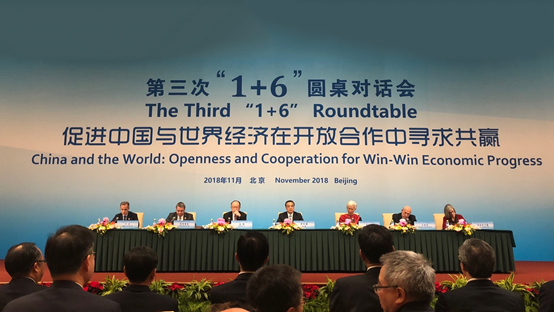
Politics
15:19, 06-Nov-2018
Premier Li: China's economy remains stable and healthy
Updated
15:02, 09-Nov-2018
CGTN
01:46

"China will not engage in competitive devaluation, is capable of coping with possible shocks, and has the ability to maintain a stable and reasonable exchange rate of RMB."
"The fundamentals of the Chinese economy have not changed, and China is confident in handling the downward pressure on economic growth," noted Chinese Premier Li Keqiang Tuesday at the media briefing after the third "1+6" round table dialogue in Beijing, which revolves around global economic trends, multilateral trading system, China's economy and its reform and opening up.
Also present at the meeting were the heads of six major international organizations, including President of the World Bank Group Jim Yong Kim, Managing Director of the International Monetary Fund Christine Lagarde, Director-General of the World Trade Organization Roberto Azevedo, Secretary-General of the Organization for Economic Cooperation and Development Angel Gurria, Chairman of the Financial Stability Board Mark Carney and Deputy Director-General of the International Labor Organization Deborah Greenfield.
Say no to unilateralism, trade protectionism
Li added that the downward pressure on the global economy remains strong, and urged for a concerted effort by the international community to maintain market stability under the premise of mutual respect.
He also showed deep concern over trade protectionism, and called on countries to refrain from trade and investment protectionism, as well as unilateralism, by improving trade rules, enhancing transparency, and promoting liberalization and facilitation for trade and investment.
Equal access to the market
"Besides, enterprises of different ownerships will still be treated on an equal basis," Li claimed.
"China is bound to get through the transmit mechanism of monetary policy and expand market access to basic industries for private economy and foreign-funded enterprises, ensuring fair competition among assorted enterprises."
Further steps in cutting taxes
Regarding the financing difficulties to solve for small- and medium-sized enterprises (SMEs), Li went on record as saying China will "continue to reduce the taxes and fees charged to businesses," and "improve its business environment."
Li emphasized SMEs are the mainstay of expanding employment and effective for inclusive growth, and "will further open the service sector."
"China will shy away from a scattergun approach to stimulating the monetary system, and in the meantime avoid the situation of relying solely on investment and exports. Instead, proactive fiscal policies will be in place to inspire the creativity of the market players and the society," said Li.
All parties involved in the dialogue conducted an in-depth discussion for coping with global challenges and pushing forward world economic recovery, who all acknowledged that China is irreplaceable in the global economy.

SITEMAP
Copyright © 2018 CGTN. Beijing ICP prepared NO.16065310-3
Copyright © 2018 CGTN. Beijing ICP prepared NO.16065310-3